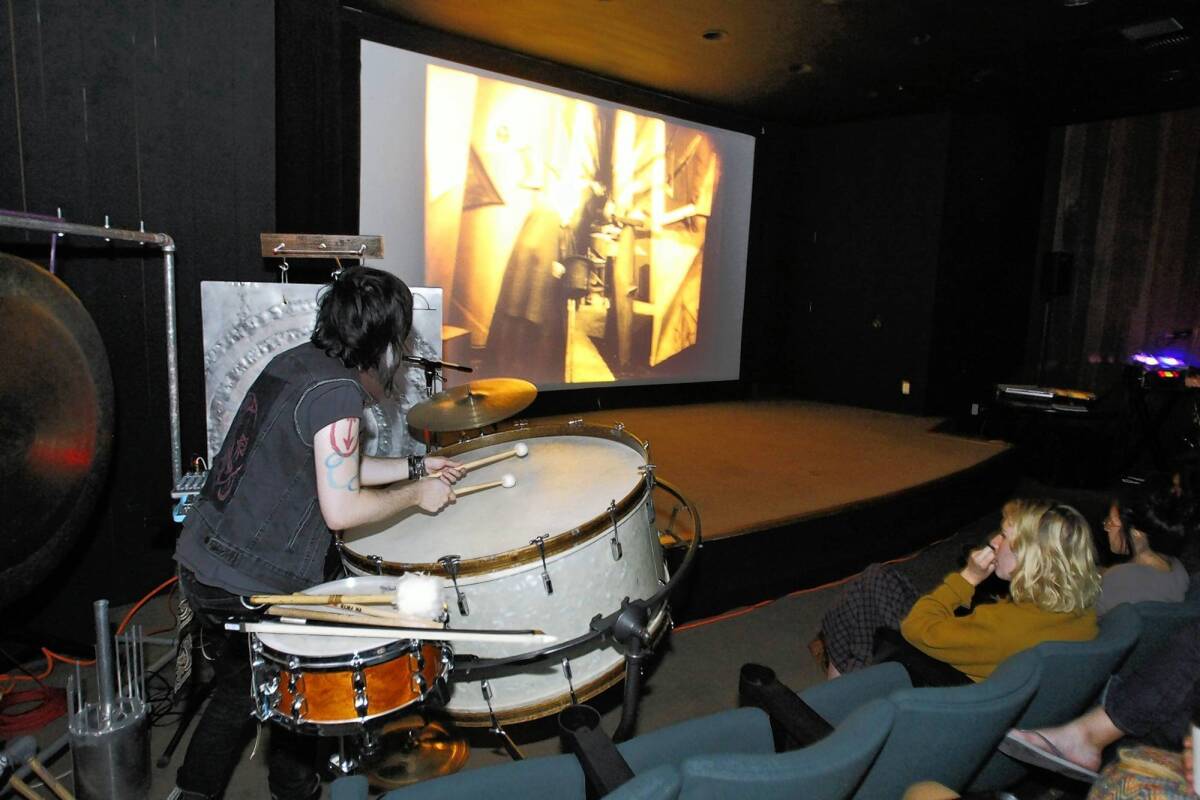Cal Arts students add a contemporary sound to silent movies

- Share via
A hot ticket every fall at California Institute of the Arts is Gary Mairs’ weekly silent movie screenings for his film history class. You read that right — silent movie screenings.
The Bijou Theater is not packed because students at the Valencia campus are crazy for silent movies necessarily, but because of the live music that accompanies these classics.
Since 2004, Mairs has invited students, faculty and alumni at CalArts’ Herb Albert School of Music to accompany the films. Over the years, the music has run the gamut from an original string quartet for Carl Theodore Dryer’s 1928 “The Passion of Joan of Arc” to an improvised accompaniment for D.W. Griffith’s 1919 “Broken Blossoms,” which combined American folk with experimental/electronic music, to a free jazz score for 1929’s “Man With a Movie Camera.”
PHOTOS: The Roaring ‘20s on-screen
As a student at San Francisco State, Mairs found the more traditional scores for the silent films screened in class “off-putting. I started to actually really engage with silent films when I saw screenings out of school. The Castro would occasionally show silent films with an organist or occasionally live bands. It was a radically different experience.”
Because “Cal Arts has a history of experimentation,” said Mairs, he decided to include live, nontraditional performances at the screenings. Since he knew a lot of musicians at Cal Arts, Mairs initially asked them to score and perform.
“Very quickly people got interested,” said Mairs, who has been teaching at the School of Film/Video since 1997 and has been co-head of the Film Directing Program since 2005.
Once Mairs plans his films for the fall, he sends the list to the musicians, faculty and graduates and asks them which ones they are interested in composing. “I find they tend to do their best work when they are excited about a project,” Mairs said.
Rarely does one of his students in the class tackle a score. “The class is quite rigorous,” Mairs said. “It is a major commitment for the people who are doing the compositions.”
Last year, though, Herb Albert student Kevin Robinson juggled the classwork in Mairs’ film history class as well as composing the string quartet for “The Passion of Joan of Arc.”
Robinson liked the experience so much that he and three other musicians recently provided accompaniment for Sergei Eisenstein’s 1925 “Battleship Potemkin.”
But he decided not to compose a string quartet for “Potemkin” because the Eisenstein’s classic “is so metric and moving and things happen quickly, so I wrote little sketches for everyone,” said Robinson, a week before the performance. “I am going to a minimalist thing, not that heavy on the texture, more like sketching things out.”
This week, student Hannah Dexter, a composer and bassist who specializes in Gypsy jazz and blue grass, will be working her magic on Charlie Chaplin’s 1925 “The Gold Rush.” Dexter will be playing the upright bass and providing vocals. Rounding out the trio are a guitarist/vocalist and a violinist.
“Though I wasn’t 100% familiar with the ‘The Gold Rush,’ I have always been a huge Charlie Chaplin fan,” Dexter said. “I understand what they were looking for. I love bluegrass and I love Gypsy jazz and I love Charlie Chaplin.”
Mairs acknowledged that some students complain about the scores, while “there are students who are completely enraptured,” he said.
“When I talked to the class about it about it a couple of weeks ago I stressed that the films I am showing are so strong,” Mairs added. “It’s like Shakespeare. You can do Shakespeare in a million different ways and the plays will survive. I think these films are like that.”
PHOTOS AND MORE
VIDEO: Upcoming fall films
ENVELOPE: The latest awards buzz
PHOTOS: Greatest box office flops
More to Read
Only good movies
Get the Indie Focus newsletter, Mark Olsen's weekly guide to the world of cinema.
You may occasionally receive promotional content from the Los Angeles Times.











